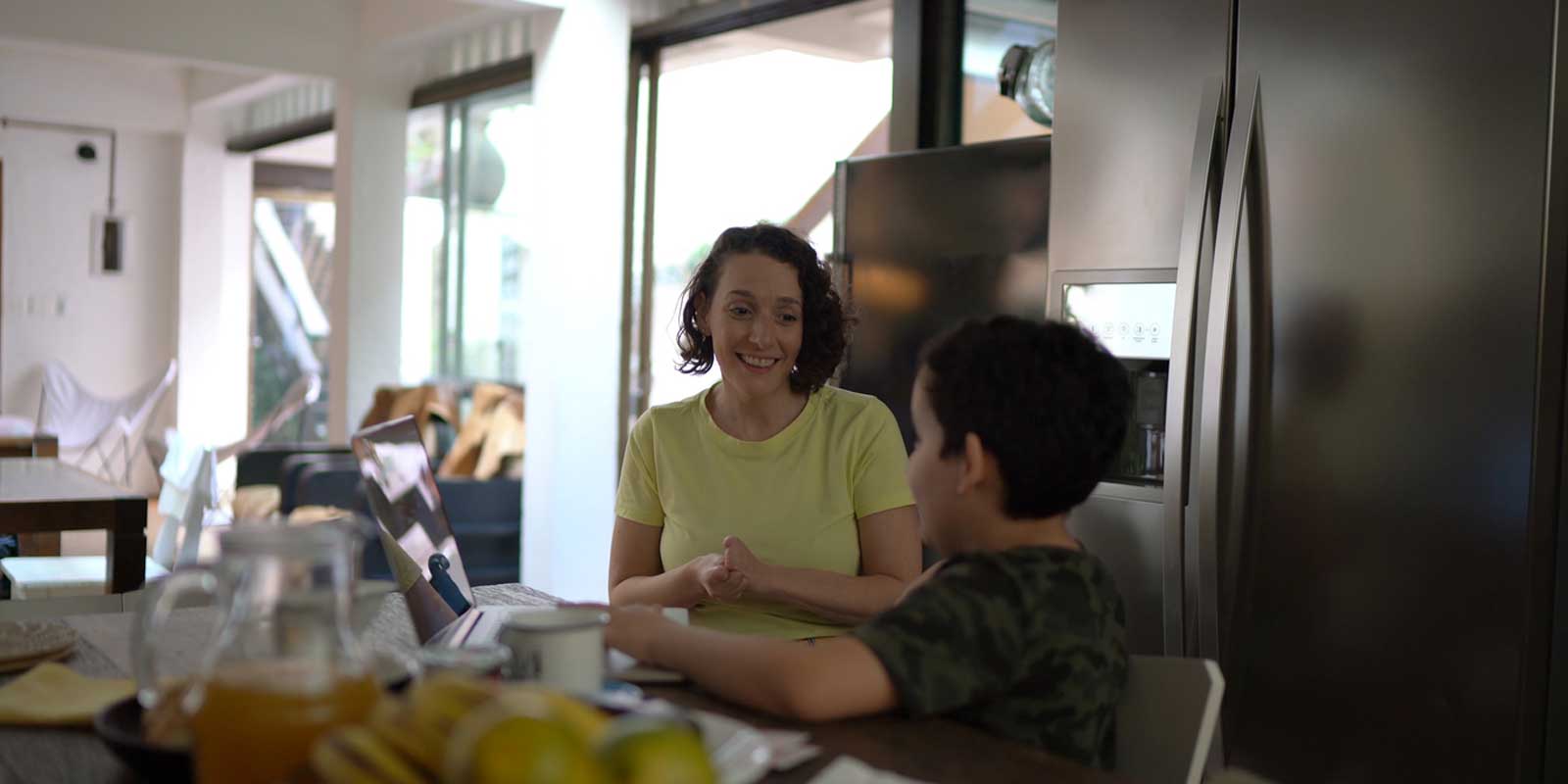Not everybody feels comfortable talking about bodies and weight. It might be an emotive subject for you. Or you might be worried that talking about size might make your child feel self-conscious about their body, and perhaps put ideas into their head about being over- or underweight, or encourage them to judge their own or other people’s body shapes. But it’s a good idea not to make weight and size a taboo subject, so your child knows that you’ll always be honest with them and that they can come to you if they have any worries.
Should I talk to my child about weight?
As a parent there are lots of things we have to talk to our kids about that we’d perhaps rather ignore – from sex to online dangers. And for many of us, weight is another of these awkward subjects. And of course it’s up to you to decide what to talk to your child about – you know them best. But there are times when it can be helpful to talk openly to your child about weight. Here are some examples:
- Talking about size and weight rather than avoiding the topic helps build trust and can help prevent your child from feeling that their weight is something to be ashamed about or that they have to keep secret. If they have any worries, they’ll be more likely to come to you, and you can talk through their concerns together.
- Children will hear lots of different things about weight from many places – in school, from friends, on TV, online and through social media. You can help them to see that what they hear about shape, size and weight is not always right or helpful.
- Talking to you about their shape, size or weight could be your child’s only chance to ask questions openly and learn about their weight and health.
- Talking about weight as just one part of keeping healthy can help prevent them worrying about it.
What words should I use?
Some people prefer to talk about growth and health, or exercise and healthy eating, rather than using the word ‘weight’. If this is what you and your child are comfortable with, this is fine. But sometimes it can be helpful to use the word ‘weight’, for example, if:
- your child asks about their own or someone else’s weight or size
- you hear your child use hurtful words about someone’s size
- other people, including health professionals, talk about weight with your child
- your child mentions talking about weight or weight teasing at school – you could take this as a chance to ask them what they think about weight and how they talk about it with their friends.
Try not to make ‘weight’ a banned word as this can create shame and worry. Talk openly about weight, size and shape if your child wants to.
Tips for talking to your child about health and weight
Tip #1: Focus on health rather than weight

Being healthy is about eating a balanced diet, keeping active and getting plenty of rest. It’s so much more than how much we weigh or what our individual body shape is.
So if you do talk about your child’s weight, let them know it’s because you want them to grow well and be healthy, not because they should look a certain way. And when you’re talking to your child about the things they can do to look after their health (like keeping active and eating plenty of fruit and veg), focus on how these things will make them feel better and fitter, not thinner.
Tip #2: Don’t feel you need to know all the answers
You might avoid talking about weight because you’re not sure how to answer any questions. But remember, the most important thing is that your child feels able to talk to you, not whether you have the perfect answer straight away.
If you don’t know the answer to a question they ask, you could take it as an opportunity to talk about it (‘I don’t know – what do you think?’), talk to other family members or friends about it or to look up the answer together on a reliable website like NHS Inform.
Tip #3: Choose your moment
Pick times when it’s more natural to talk about food, activity or weight. For example:
- if your child brings up the topic when you’re chatting together
- if the issues of weight or diet come up in something you’re watching together you could discuss the storyline
- when a child talks about their own or someone else’s size, you could use this as an opportunity to chat about it.
Tip #4: Respect their privacy
Your child may not want to talk about weight or size in front of other siblings or family members, so try to find a time when no one else is around and you can chat privately, for example, when you’re walking somewhere or are in the car.
Tip #5: Give them time and space
Don’t push them to talk about weight or size if they choose not to. As long as they know you’re open to talking about it, they’ll come to you in their own time.
Tip #6: Ask open questions
Open questions require more than a yes or no answer, so asking open questions can encourage your child to talk about what they’ve heard or may be worried about. For example, you could ask them ‘What do you think about….?’ instead of ‘Are you worried about…?’
Tip #7: Make it a chat not a lecture

If you’re talking about healthy eating or being more active or size and weight, make sure you give your child plenty of time and opportunity to ask questions and bring up anything they may be wondering about.
Tip #8: Remind your child that their weight is not who they are
Make sure they know that everyone deserves respect – whatever their body size, shape or ability. Praise your child for a variety of things so they know you love them for who they are, not what they look like or only when they do well at something.
Tip #9: Remember your child isn't you
Your child doesn’t necessarily feel the same way about their weight or size as you do, or as you did as a child, so don’t assume you know how they feel.
If I’m not happy with my weight, how can I help my child with theirs?
Many adults are unhappy about the way they look or struggle with their weight, so if you feel this way you’re certainly not alone. But you can still help your child to be healthy.
If you’re trying to gain or lose weight yourself it’s a good idea to avoid talking about diets and dieting or eating different foods from the rest of the family. Instead, try to show your child that healthy eating and keeping active are normal and important for everyone.
If you’re increasing the amount of exercise you do, try to pick an activity you enjoy. This way your children will see you enjoying physical activity, rather than treating it as a chore, and this might encourage them to be more active themselves too.
You can find some helpful tips for improving how you feel about your body on the Mental Health Foundation website. You can get advice on eating healthily and keeping active on the NHS Inform website.
Dealing with different issues around weight
Weight isn’t just a number – it can be tied in with other issues like body image, confidence and bullying. These pages have more information that can help:
- helping your child have a good body image
- helping your child be more confident
- helping your child with problems with friends
- help if you're concerned about bullying.
This article is based on research carried out at the University of Bath. You can find out more about this research here.
 Activities & Play
Activities & Play Behaviour
Behaviour Childcare
Childcare Development & Growing Up
Development & Growing Up Family, Friends & Relationships
Family, Friends & Relationships Feeding Your Baby
Feeding Your Baby Food & Eating
Food & Eating Health & Safety
Health & Safety Mental Health & Wellbeing
Mental Health & Wellbeing Money & Work
Money & Work Online Behaviour & Safety
Online Behaviour & Safety Pregnancy & First Days
Pregnancy & First Days School & Education
School & Education Sleep
Sleep









 Mental Health & Wellbeing
Mental Health & Wellbeing
 Online Behaviour & Safety
Online Behaviour & Safety